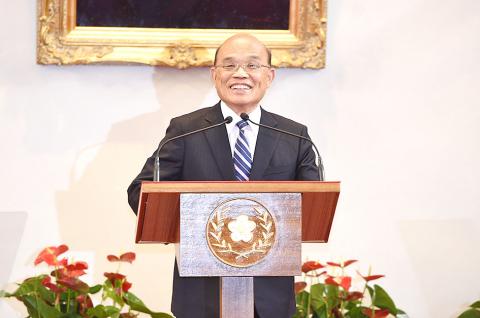Former premier Su Tseng-chang (蘇貞昌) is to be sworn in as the new premier on Monday, President Tsai Ing-wen (蔡英文) said yesterday.
The appointment came in the wake of the Democratic Progressive Party’s (DPP) heavy losses in the Nov. 24 local elections, which led to Tsai’s resignation as party chairperson and the Cabinet’s mass resignation on Thursday.
At a news conference at the Presidential Office in Taipei, Tsai said that she asked Su to take the role as he possesses three characteristics the nation needs at this moment: experience, boldness and the ability to get things done.

Photo: George Tsorng, Taipei Times
Su’s philosophy of “breaking new ground” was evidenced by his campaign last year for the mayorship of New Taipei City through his employment of young campaign employees, innovative policymaking or creativity in promotions, she said.
In addition to fulfilling its promise to “make Taiwan great,” the administration would from now on focus more on equitable distribution of public resources and caring for disadvantaged people, Tsai said.
The nation is facing numerous challenges this year, including a US-China trade dispute and Chinese President Xi Jinping’s (習近平) proposal to introduce a Hong Kong-style “one country, two systems” formula for Taiwan, she said.
“This is a year for us to strive to improve people’s lives, defend democracy and safeguard our sovereignty,” she said.
Tsai said that she would work closely with Su, whose decades of experience would enable him to lead with conviction as they help the nation navigate ever-changing international situations.
She extended her gratitude to outgoing Premier William Lai (賴清德) for his “pragmatic” approach that has helped the government achieve many of its goals in terms of reform and development.
“This is a daunting task at a critical moment,” Su said, thanking Lai for his team’s outstanding governance, which has laid the groundwork for Su’s team.
He added that he would strive for even greater achievement.
Citing a quotation often misattributed to former British prime minister Winston Churchill, Su said: “Success is not final, failure is not fatal.”
Churchill during World War II led the UK through its darkest hours, and after the war he again served as leader to the great acclaim of Queen Elizabeth II and the public, despite his age, said Su, who is 71.
“I shall roll up my sleeves and lead my team to meet the public’s expectations and bring the government in sync with public opinion,” he said.
Comparing himself to a “middle relief pitcher” for the DPP and Su as the “closer,” Lai praised Su’s “invaluable” experience and wished him good luck.
Later yesterday, former Taichung mayor Lin Chia-lung (林佳龍), who lost his re-election bid in last year’s elections, said on Facebook that he has accepted Su’s offer to serve as minister of transportation and communications.
The Chinese Nationalist Party (KMT) caucus ridiculed Su, Lin and another potential Cabinet member, former DPP legislator Chen Chi-mai (陳其邁), for their unsuccessful campaigns last year, calling them a “union of losers” and members of a “DPP veterans’ affairs council.”
Additional reporting by Chen Yun

INVESTIGATION: The case is the latest instance of a DPP figure being implicated in an espionage network accused of allegedly leaking information to Chinese intelligence Democratic Progressive Party (DPP) member Ho Jen-chieh (何仁傑) was detained and held incommunicado yesterday on suspicion of spying for China during his tenure as assistant to then-minister of foreign affairs Joseph Wu (吳釗燮). The Taipei District Prosecutors’ Office said Ho was implicated during its investigation into alleged spying activities by former Presidential Office consultant Wu Shang-yu (吳尚雨). Prosecutors said there is reason to believe Ho breached the National Security Act (國家安全法) by leaking classified Ministry of Foreign Affairs information to Chinese intelligence. Following interrogation, prosecutors petitioned the Taipei District Court to detain Ho, citing concerns over potential collusion or tampering of evidence. The

Seventy percent of middle and elementary schools now conduct English classes entirely in English, the Ministry of Education said, as it encourages schools nationwide to adopt this practice Minister of Education (MOE) Cheng Ying-yao (鄭英耀) is scheduled to present a report on the government’s bilingual education policy to the Legislative Yuan’s Education and Culture Committee today. The report would outline strategies aimed at expanding access to education, reducing regional disparities and improving talent cultivation. Implementation of bilingual education policies has varied across local governments, occasionally drawing public criticism. For example, some schools have required teachers of non-English subjects to pass English proficiency

NEGOTIATIONS: The US response to the countermeasures and plans Taiwan presented has been positive, including boosting procurement and investment, the president said Taiwan is included in the first group for trade negotiations with the US, President William Lai (賴清德) said yesterday, as he seeks to shield Taiwanese exporters from a 32 percent tariff. In Washington, US Trade Representative Jamieson Greer said in an interview on Fox News on Thursday that he would speak to his Taiwanese and Israeli counterparts yesterday about tariffs after holding a long discussion with the Vietnamese earlier. US President Donald Trump on Wednesday postponed punishing levies on multiple trade partners, including Taiwan, for three months after trillions of US dollars were wiped off global markets. He has maintained a 10 percent

TRADE: The premier pledged safeguards on ‘Made in Taiwan’ labeling, anti-dumping measures and stricter export controls to strengthen its position in trade talks Products labeled “made in Taiwan” must be genuinely made in Taiwan, Premier Cho Jung-tai (卓榮泰) said yesterday, vowing to enforce strict safeguards against “origin laundering” and initiate anti-dumping investigations to prevent China dumping its products in Taiwan. Cho made the remarks in a discussion session with representatives from industries in Kaohsiung. In response to the US government’s recent announcement of “reciprocal” tariffs on its trading partners, President William Lai (賴清德) and Cho last week began a series of consultations with industry leaders nationwide to gather feedback and address concerns. Taiwanese and US officials held a videoconference on Friday evening to discuss the